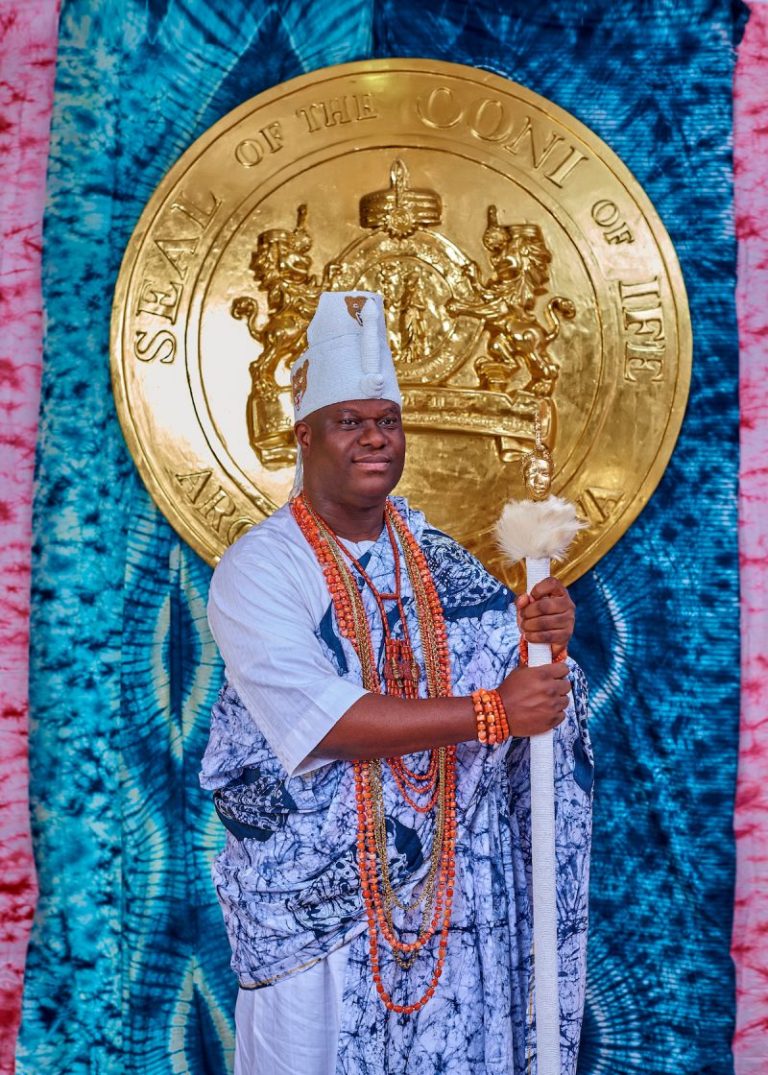By Sola Ojewusi
In an age where leadership too often builds walls instead of bridges, where thrones can become distant and monarchs aloof, the Ooni of Ife, His Imperial Majesty Oba Adeyeye Enitan Ogunwusi, Ojaja II, has brought to the revered throne of Oduduwa what can only be described as a breath of fresh air—a human face, a father’s heart, and a loving patriarch’s embrace. His down-to-earth attitude, his readiness to stoop in love to lift up his children, and his willingness to snuggle up to his offspring—both biological and metaphorical—speak volumes about a man on a divine mission: to bring home, to culture, to heritage, the many errant or lost children of Oodua.
Let it be clearly stated: we have never had it so good. Here is a father who has chosen not to hide behind high palace walls or unnecessary diplomacy; here is a royal who understands that true nobility lies not in distance but in closeness, not in icy protocol but in warm-hearted engagement.
A Divine Mandate: Drawing the Children Back Home
From the moment he ascended the throne, the Ooni has made his mission clear: to reconnect the children of Oduduwa with their roots. In his view, the throne is not an idol to be worshipped from afar, but a platform to serve, to nurture, and to guide. And so he extends his arms of love to all—whether near or far, rich or poor, titled or untitled.
This is no accident. It is no public relations gimmick. The Ooni is driven by a deep sense of purpose, a recognition that the Yoruba nation—indeed, the black race—must rediscover its soul through the family, through culture, through unity. His outreach is not selective; his love is not discriminatory. The father of the race knows that the house divided against itself cannot stand. His is a mission to heal wounds, bridge gaps, and restore dignity.
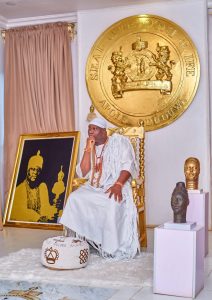
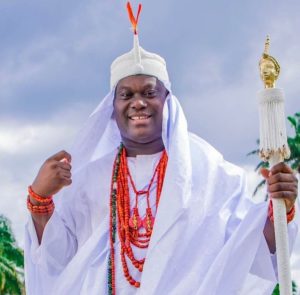
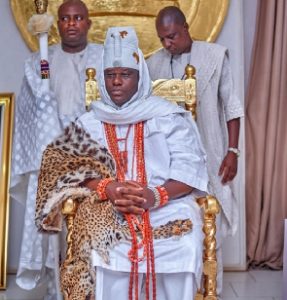
Those who misunderstand or attempt to malign this fatherly outreach expose their own ignorance of the true meaning of royalty. They fail to grasp the essence of kingship in Yoruba cosmology—a kingship that, while revered, is ultimately about service, protection, and fatherhood.
The Tiger Does Not Proclaim Its Tigritude
There are those who mutter—perhaps out of envy, perhaps out of ignorance—that a monarch should remain lofty, untouchable, fenced off from his people in perpetual mystique. But as the great Wole Soyinka once reminded us, “the tiger does not proclaim its tigritude; it pounces.” The Ooni does not need to shout about his majesty; his every action radiates the strength, dignity, and grace of his office.
To see him bend to embrace a child, to smile warmly at his subjects, to engage his people in open-hearted dialogue is not to see weakness or the dilution of royalty. It is to see the very power of the throne at work—the power that draws rather than repels, that unites rather than divides.
If there is any fault, it lies not with the Ooni, but with those who mistake his fatherly love for license to misbehave, who imagine that his humility invites disrespect. The onus is on every cultured, well-brought-up ọmọ ọkọ, child of Oduduwa, to know their limits, to honor the sacredness of the stool even as the occupant shows them unprecedented affection.
Courtesy and Humility: The Natural Nobility of the Ooni
Those who know Oba Ogunwusi intimately will affirm that his humility, kindness, and courtesy are not acts put on for the camera. They are his nature; they are the man. Long before he ascended the throne, these were his trademarks—hallmarks of a noble soul. And now, as custodian of our heritage, he brings these qualities to bear in the service of the race.
It is easy to be regal and remote. It takes courage, confidence, and a deep well of love to be regal and accessible. The Ooni, in his wisdom, understands that the throne of Ife is not weakened by approachability; it is strengthened by it. Each time he bends to lift a child onto his knee, each time he clasps hands with the youth, each time he engages directly with the common man, he dignifies the throne all the more.
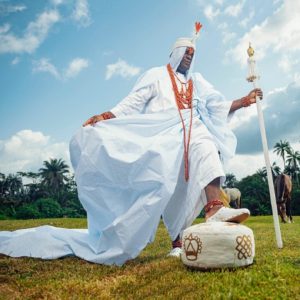
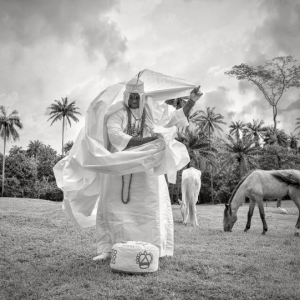
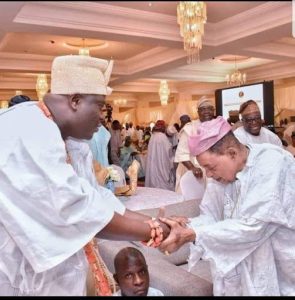
A Curse on Arrogance, A Blessing on the Humble
It must be said without fear of contradiction: those who see in the Ooni’s outreach an opportunity to drag culture in the mud, who respond to his affection with arrogance or contempt, bring a curse upon their own heads. The Yoruba believe deeply in the sanctity of respect. The monarch’s humility does not absolve the subject of their duty. Indeed, it places an even greater moral obligation on the subject to reciprocate love with loyalty, kindness with respect, openness with decorum.
Let no one think that because the Ooni draws close, the throne loses its mystique. The palace remains sacred. The crown retains its aura. The staff of office still embodies the authority of Oduduwa himself. But in the Ooni, we see a modern embodiment of ancient wisdom—a leader who knows that a father’s strength lies in his ability to stoop, to serve, to love.
A Patriarch for the Times
In an era where many traditional institutions grapple with relevance, the Ooni has shown the way. By blending tradition with human warmth, by pairing protocol with approachability, he has given the ancient throne of Ife a modern vitality that resonates across generations. The youth see in him a father they can trust; the elders see in him a worthy custodian of their legacy.
Consider his outreach to the diaspora—his efforts to reconnect Yoruba descendants scattered across the globe with their ancestral roots. Consider his tireless promotion of Yoruba culture, language, and values at home and abroad. Consider his bridge-building across faiths, classes, and communities. These are not the actions of a ruler who seeks to isolate himself. They are the actions of a father determined to gather his children home, no matter how far they may have wandered.
We Have Never Had It So Good
It bears repeating: we have never had it so good. In the Ooni, we have a monarch who embodies the best of our past while pointing the way to a brighter future. We have a king who understands that the strength of the throne lies not in distance, but in connection. We have a father who loves his children too much to hide behind palace gates.
Those who would criticize this style miss the point entirely. They are trapped in outdated notions of kingship as cold, remote, unfeeling. But the Yoruba crown has always been more than that. It is both symbol and substance, both power and service. And in the Ooni’s hands, it shines all the brighter for his down-to-earth, loving approach.
A Call to the True Children of Oodua
Let this be a call to all true children of Oduduwa: cherish this father, honor this king. Recognize the rare gift that has been given to us in the person of Oba Adeyeye Enitan Ogunwusi. Let us not mistake his kindness for weakness, nor his humility for lack of authority. Rather, let us rise to the challenge his love presents—let us be worthy children of a worthy father.
Let the social climbers, the arrogant, the disrespectful take heed. The Ooni’s open arms are not an invitation to impunity. The throne remains sacred. Culture remains supreme. And those who spit on these values will find that they have only brought misfortune upon themselves.
The Verdict of History
In years to come, when the history of this era is written, Oba Adeyeye Enitan Ogunwusi will stand tall as a monarch who dared to love his people deeply, who chose connection over isolation, who saw his role as that of a true patriarch—a father who would rather gather his children than fence himself off in needless pomp.
His is an odyssey of love, of service, of restoration. His is a style that is at once pungent and poignant, thought-provoking and trailblazing. The Ooni has shown us the greatness of the throne through his outreach of love. May we, his children, prove ourselves worthy of such a father.
Sola Ojewusi, Publisher of The Lagosian Magazine can be reached on +2348032892222.

